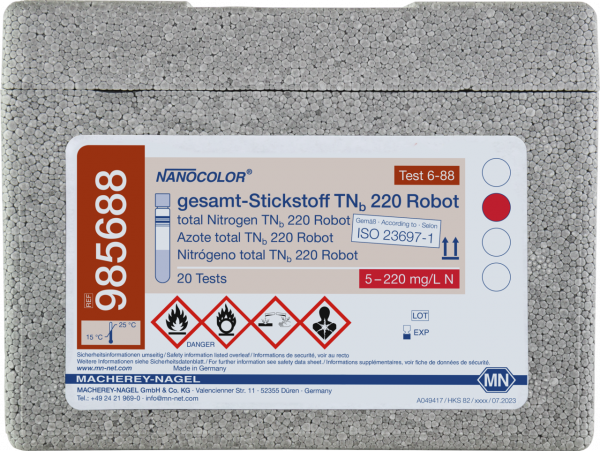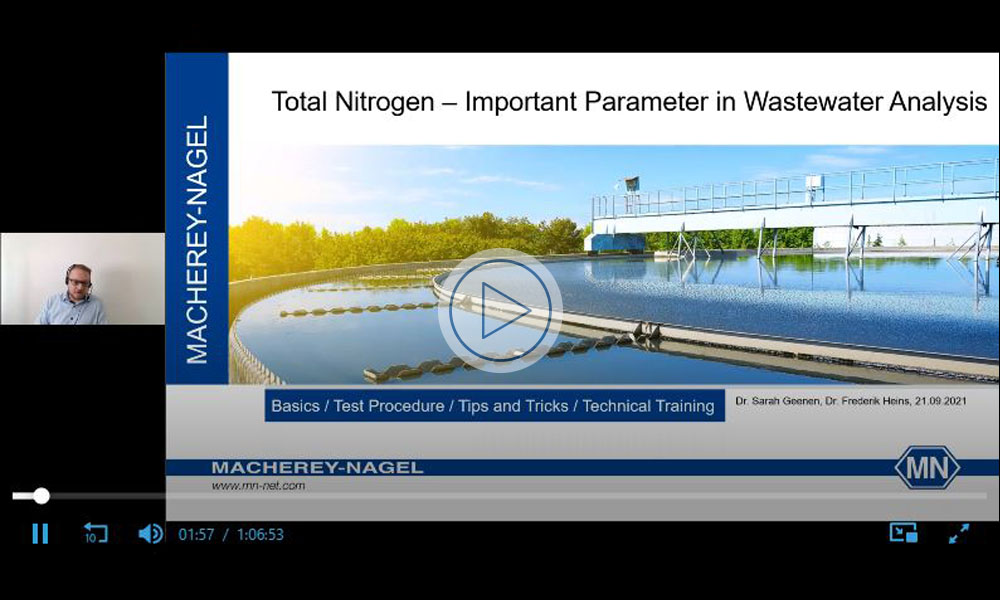Tube test NANOCOLOR total Nitrogen TNb 220 Robot
*taxes and shipping not included
Delivery time approx. 5 working days
Tube test for the determination of Total Nitrogen. Suitable for automated water analysis on the Skalar Robot SP2000series. Precise rapid tests for all kind of water and waste water samples.
| Brand | NANOCOLOR |
| Platform | NANOCOLOR tube tests |
| Parameter | Total Nitrogen |
| Measuring range | Total Nitrogen - 5–220 mg/L N |
| Sludge reagent set | No |
| Test No. | 6-88 |
| Evaluable on | VIS, VIS II |
| Based on norm | In accordance with ISO 23697-1 2023-02 – Digestion - Analogous to DIN EN ISO 11905-1 H36. Determination - Analogous to ISO 7890-1, DIN 38405 – D9 |
| Method | Total -Nitrogen - 2,6 -Dimethylphenol |
| NanOx N | Yes |
| NanOx Metal | No |
| Crack-Set | No |
| Sea water analysis | No |
| Remark | Measuring range on NANOCOLOR VIS II |
| Shelf life (from production) | 1 Year(s) |
| Storage temperature | 15–25 °C / 59–77 °F |
| Scope of delivery | 2 rugged boxes with 20 test tubes for decomposition and 20 test tubes for analysis. Sufficient for 20 tests. |
| Gross weight (incl. packaging) | 1320.4 g / 2.91 lbs |
| Packaging dimensions | 330 x 160 x 127 mm / 12.99 x 6.30 x 5.00 Inch |
| Hazardous material | Yes |
Total nitrogen (TNb)
What is total nitrogen (TNb)?
Total nitrogen (TNb) is a cumulative parameter. TNb stands for total bound nitrogen. Both organic nitrogen (urea, peptides, proteins) and inorganic or mineral nitrogen (ammonium/ammonia, nitrate, nitrite) are detected. Gaseous elemental nitrogen N2 which is contained in the water cannot be determined.
The nitrogen compounds present in water bodies are mainly degradation or decomposition products of substances containing organic nitrogen (primarily proteins and urea).

How to perform the NANOCOLOR total Nitrogen tube test
Relationships between nitrogen compound parameters
As the first inorganic degradation product during bacterial nitrification ammonium NH4+ is obtained, which then reacts via the labile intermediate nitrite NO2– to ultimately form nitrate NO3–.
One goal of water protection is to protect surface waters against eutrophication from excessive entry of e.g. nitrogen compounds (excessive nutrient loads). To achieve this, the water protection provided by federal and state governments provides for certain discharge conditions which are defined in the water discharge permits, and self-control regulations in the respective states. Important processes for degradation of nitrogen compounds include nitrification and denitrification. Control and optimization of such processes is based on the use and proper documentation of appropriate methods of analysis.
The term Total Kjeldahl Nitrogen (TKN) is defined as the total amount of organically bound nitrogen and ammonia nitrogen. In the presence of detectable amounts of nitrate/nitrite, TKN can be calculated by subtracting the nitrate/nitrite nitrogen from total nitrogen TNb.
The relationship between these parameters in nitrogen analysis is summarized in the following flow chart:

Reaction basis
In an acidic medium, all organic and inorganic nitrogen-containing substances are oxidized to nitrate (in analogy to ISO 7890-1).
The underlying reaction is also analogous to DIN EN ISO 11905-1 and DIN 38405-D9. Nitrate reacts in acidic solution with 2,6-dimethylphenol to form 4-nitro-2,6-dimethylphenol, which can be determined photometrically. In samples with low nitrate and nitrite concentrations, this method (in analogy to ISO 7890-1) yields results similar to the determination of TKN (covering only ammonium and organic nitrogen compounds). In case of detectable amounts of nitrate and nitrite, the TKN value can be determined by subtracting the nitrate/nitrite values from the total nitrogen value TNb.
Become an expert in TNb Analysis - Online Seminar
If you want to learn more about this parameter feel free to watch the online seminar. Just follow this link:
Tips and Tricks
Filtration
For cumulative parameters, the sample must not be filtered prior to decomposition! By filtration, poorly soluble nitrogen compounds are removed and can thus not be detected. Thereby incorrect results are obtained.
pH
The pH of the sample to be decomposed must be between 5 and 9. If necessary, adjust the pH with sulfuric acid or sodium hydroxide.
Background information
The NANOCOLOR total nitrogen tube tests meet the requirements of ISO 23697-1:2023-02: Water quality — Determination of total bound nitrogen (ST-TNb) in water using small-scale sealed tubes — Part 1: Dimethylphenol colour reaction.
This standard method specifies the determination of total bound nitrogen in groundwater, surface water, and wastewater with measuring ranges from 0.5–220 mg/L N.
These standards provide clear guidelines and procedures for accurately measuring of total nitrogen in water samples. By adhering to these standards, our customers can be sure that our NANOCOLOR test kits are precise, reliable and comparable.
Interferences
Nitrogen concentrations above the double measuring range can simulate measured values that lie within the simple measuring range and may thus be misinterpreted.
There is a risk of incomplete decomposition for samples that consume large amounts of oxidizing agents (e.g. having COD values above 5000 mg/L O2). In these cases, the decomposition has to be repeated with the original sample diluted before.
Sea water suitability
The NANOCOLOR total Nitrogen TNb tests are not suitable for seawater analysis.






